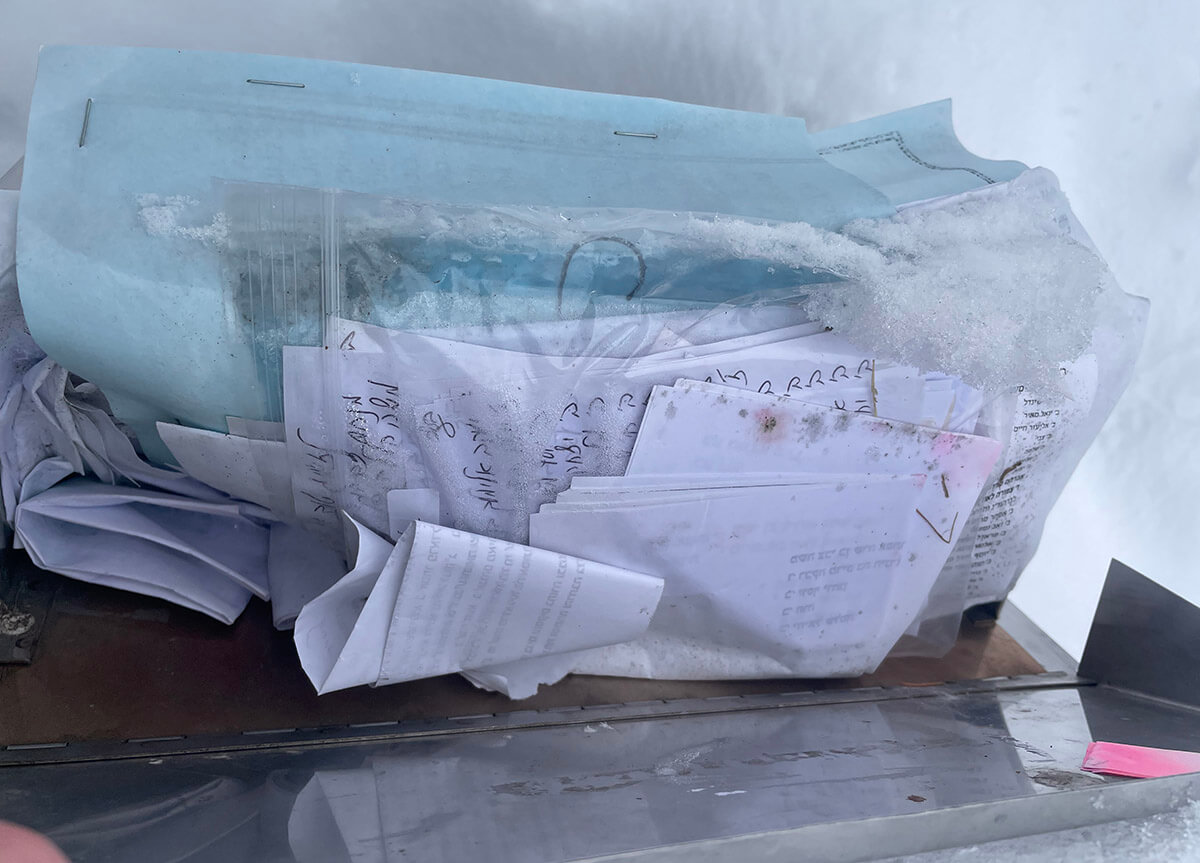Uncategorized
A Golda Meir biopic starring Helen Mirren avoids politics. It premiered as Israel’s government faces widespread scrutiny.
(JTA) — When a film about a group of Israeli youths who visit former concentration camps in Poland premiered on Sunday at the Berlin Film Festival, its Israeli producer took the microphone after the screening to decry the state of his nation.
“The new far-right government that is in power is pushing fascist and racist laws,” said Yoav Roeh, a producer of “Ha’Mishlahat” (“Delegation”) on stage after the film’s premiere. He was referring to lawmakers in Israel’s government who have long histories of anti-Arab rhetoric and their new proposals to limit the power of the country’s Supreme Court, which critics at home and around the world deem a blow to Israel’s status as a democracy.
“Israel is committing suicide after 75 years of existence,” Roeh added.
The next day brought the premiere of “Golda,” a highly-anticipated Golda Meir biopic starring Oscar winner Helen Mirren about the former Israeli prime minister and her decisions during the 1973 Yom Kippur War. Hours earlier, Israel’s government took another step closer to passing its controversial judicial reforms, and when asked about the political situation, Mirren didn’t mince words.
“I think [Meir] would have been utterly horrified,” she told AFP. “It’s the rise of dictatorship and dictatorship was what has always been the enemy of people all over the world and she would recognize it as that.”
That was the heated backdrop for the debut of “Golda,” which will not hit U.S. theaters until August. But an onlooker wouldn’t know that from the film’s own introductory press conference with Mirren, director Guy Nattiv and other stars from the film. The headlines that have emerged from it have been dominated by the film’s place in the “Jewface” debate, about who should play Jewish characters on screen. Mirren is not Israeli or Jewish.
“Let’s say that we’re making a movie about Jesus Christ. Who’s going to play him?” Mirren’s co-star Lior Ashkenazi stepped in to answer in response to a journalist, eliciting laughter from the press corps.
The film is framed by Meir’s testimony to the Agranat Commission, which investigated the lead-up to the war. As the film shows through flashbacks, Meir appears to have not acted quickly enough on Mossad intelligence about a possible attack from Egyptian and Syrian forces. Israeli forces were surprised on the holiday and initially lost ground; both sides lost thousands of troops, and the war is seen as a major trauma in Israeli history — the moment when the state’s conception of its military superiority over its Arab neighbors was shattered. The film is claustrophobic, shot mostly indoors — in bunkers, hospital rooms and government offices — and offers an apt visual encapsulation of the loss the war would bring.
Mirren walks the red carpet at the Berlin Film Festival, Feb. 20, 2023. She spent time on a kibbutz in 1967. (Courtesy of Berlinale)
Though Meir has historically been lionized as a tough female hero in the United States and in Jewish communities around the world (even non-Jewish soldiers in Ukraine took inspiration from her in the early days of the Russian invasion last year), her legacy is more complicated in Israel and the Palestinian territories. In addition to being associated with the trauma of the war for many Jewish Israelis, she is remembered as an inveterate enemy by Palestinians.
In recent years, the representation of Meir has shifted more favorably in Israel, said Meron Medzini, Meir’s former press secretary and one of her biographers. He said that historians have begun to view her favorably in comparison to some of the political leaders who followed her.
“I consider the film [‘Golda’] part of this effort to rehabilitate her name,” he told the Jewish Telegraphic Agency. “I think she is now gaining her rightful place in the history.”
“Golda” fits into Medzini’s narrative by emphasizing the intractability and pride of her Cabinet ministers as the prime reasons for Israel’s surprise. It affirms Meir’s honor by portraying her as attempting to protect the ministers from criticism — all men — and to promote national unity.
At the press conference, Nattiv gave the briefest of nods to Meir’s complex legacy but like Medzini compared her to Israel’s current slate of leaders, who he reserved brief criticism for.
“Golda is not a super clean character in this movie,” said Nattiv, who is best known for directing “Skin,” a 2018 film about a neo-Nazi. “She had her faults. She made mistakes. And she took responsibility, which leaders are not doing today.”
Meir has long enjoyed a kind of star status in the United States. She was interviewed by Barbra Streisand in 1978, close to the Israeli leader’s death from cancer, for a TV special on Israel’s 30th anniversary.
“She clearly is the great-grandmother of the Jewish people [in the special] and Streisand is very reverential toward her,” Tony Shaw, a history professor at the University of Hertfordshire and the author of “Hollywood and Israel: A History,” said about the Streisand interview. “She just comes across as very humble, slightly out-of-date, out-of-time.”
“Of course, it’s very different from what we now know Golda Meir was really like,” he added, referring to her strong character and political pragmatism, which the film seeks to convey.
Since William Gibson’s critically-panned 1977 play also titled “Golda,” there have been a number of representations of Meir. Most famous among them is Ingrid Bergman’s final performance in “Golda Meir,” a four-hour-long television biopic from 1982. That production “was very much in keeping with Hollywood’s treatment of Israel in that period,” said Shaw, “which was very sympathetic towards Golda Meir, towards Israel and the troubles it was having in the first 30 years of its life.” More recently, Meir appears in Steven Spielberg’s more ambivalent 2005 film “Munich,” in which she helps to recruit the film’s protagonist to track down the figures behind the 1972 Munich Olympics attacks.
Golda Meir meets with Israeli Defense Minister Moshe Dayan and troops on the Golan Heights during the Yom Kippur War, Oct. 21, 1973. (Ron Frenkel/GPO/Getty Images)
Nattiv’s work, which has received mixed early reviews, focuses on the war as reflected in Meir’s character, forgoing engagement with broader politics or history.
“My inspiration was ‘Das Boot,’ in the way that she is in the trenches,” said Nattiv, referencing the revered World War II movie from 1981 set in a German U-boat. “She is very alone in the mayhem of war around these men.”
“This is the Vietnam of Israel,” he explained. “It is a very tough and hard look at the war and every soldier that died…Golda takes it to her heart.”
Despite the “Jewface” questioning, Nattiv compared Mirren to an “aunt” figure who, for him, had the “Jewish chops to portray Golda.” Mirren explained to the AFP that she has long felt a connection to Israel and to Meir, especially after a stay on a kibbutz in 1967, not long after the Six-Day War, with a Jewish boyfriend.
“She was at her happiest on the kibbutz actually,” Mirren said. “Their idealism, their dream of the perfect world. And I did experience that which was great.”
Sanders Isaac Bernstein contributed reporting from Berlin.
—
The post A Golda Meir biopic starring Helen Mirren avoids politics. It premiered as Israel’s government faces widespread scrutiny. appeared first on Jewish Telegraphic Agency.
Uncategorized
Board of Peace Members Have Pledged More Than $5 billion for Gaza, Trump Says

A drone view shows the destruction in a residential neighborhood, after the withdrawal of the Israeli forces from the area, amid a ceasefire between Israel and Hamas in Gaza, in Gaza City, October 21, 2025. Photo: REUTERS/Dawoud Abu Alkas/File Photo
US President Donald Trump said Board of Peace member states will announce at an upcoming meeting on Thursday a pledge of more than $5 billion for reconstruction and humanitarian efforts in Gaza.
In a post on Truth Social on Sunday, Trump wrote that member states have also committed thousands of personnel toward a U.N.-authorized stabilization force and local police in the Palestinian enclave.
The US president said Thursday’s gathering, the first official meeting of the group, will take place at the Donald J. Trump Institute of Peace, which the State Department recently renamed after the president. Delegations from more than 20 countries, including heads of state, are expected to attend.
The board’s creation was endorsed by a United Nations Security Council resolution as part of the Trump administration’s plan to end the war between Israel and Palestinian Islamist group Hamas in Gaza.
Israel and Hamas agreed to the plan last year with a ceasefire officially taking effect in October, although both sides have accused each other repeatedly of violating the ceasefire. According to Gaza’s Health Ministry, more than 590 Palestinians have been killed by Israeli troops in the territory since the ceasefire began. Israel has said four of its soldiers have been killed by Palestinian militants in the same period.
While regional Middle East powers including Turkey, Egypt, Saudi Arabia, Qatar and Israel – as well as emerging nations such as Indonesia – have joined the board, global powers and traditional Western US allies have been more cautious.
Uncategorized
Why a forgotten teacher’s grave became a Jewish pilgrimage site

Along Britton Road in Rochester, New York, a brick gatehouse sits across from ordinary homes. Beyond it lies Britton Road Cemetery, its grounds divided into family plots and sections claimed over time by Orthodox congregations and fraternal associations, past and present. Names like Anshe Polen, Beth Hakneses Hachodosh, B’nai Israel, and various Jewish fraternal organizations are found here.
On the east side of the cemetery, a modest gray headstone draws visitors who do not personally know the man buried there, who were never taught his name in school, and who claim no personal connection to his life. Some leave notes. Some light candles in a small metal box set nearby. Others whisper prayers and stand for a moment before going. They come because they believe holiness can be found here.
The grave belongs to Rabbi Yechiel Meir Burgeman, a Polish-born teacher who died in 1938. He did not lead a major congregation or leave behind an institution that bears his name. And yet, nearly a century after his death, people still visit.
Over time, Burgeman has come to be remembered as a tzaddik nistar, a hidden righteous person, whose holiness is known through their teaching and daily life rather than through any title or position. His grave has become a place of intercession. People come to pray for healing, for help in times of uncertainty, and for the hope of marriage. What endures here is not an individual’s biography so much as a practice: the belief that a life lived with integrity can continue to shape devotion, even after the body has been laid to rest.
In life, Burgeman was not known as a miracle worker or a public figure. He was a melamed, a teacher of children, living plainly among other Jewish immigrants in Rochester’s Jewish center in the early decades of the 20th century. At one point, he was dismissed from a teaching post for refusing to soften his instruction. He later opened his own cheder, or schoolroom. There was no congregation to inherit his name, no institution to archive his papers. When he died, he was buried in an ordinary way at Britton Road Cemetery, one grave among many.
What followed was not immediate.
Remembered in return

The meaning attached to Burgeman’s resting place accumulated slowly. Stories began to circulate. People spoke of his kindness, his discipline, his integrity. Over time, visitors came. The grave became a place not of answers, but of belief. For generations, this turning toward the dead has taken this same form. It is not worship. It is proximity. A way of standing near those believed to have lived rightly, and asking that their merit might still matter.
In Jewish tradition, prayer at a grave is a reflection on those believed to have lived with righteousness, asking that their merit accompany the living in moments of need. Psalms are traditionally recited. Words are often spoken quietly.
I have done something similar too. Years ago, before I converted to Judaism and before I had the means to travel, I sent a written prayer through a Chabad service that delivers letters to the grave of the Lubavitcher Rebbe in New York. Someone else carried it. I cannot say with absolute certainty what happened because of it. Only that the practice itself made space for hope that I was seen, and that a prayer was later answered in ways that shaped my life and deepened my understanding of Judaism.
Burgeman’s grave functions in a similar register, though without any institutional frame. People come not because his name is widely known, but because the story has endured. Over time, that story gathered details. The most persistent involves a dog said to have escorted Jewish children to Burgeman’s cheder so they would not be harassed along the way by other youths. The dog then stood watch until they were ready to return home. The versions differ. Some are reverent. Some are playful. Some verge on the miraculous. The story endures because it names something children needed: care, in a world that could be frightening.
In recent decades, Burgeman’s afterlife has taken on a digital form. His name surfaces in comment threads and genealogical forums, passed along by people who never met him and are not always sure how they are connected. Spellings are debated. Dates are corrected. A descendant appears. A former student’s grandchild adds a fragment. Someone asks whether this is the same man their grandmother spoke of. No single account settles the matter. Instead, memory gathers. What once traveled by word of mouth now moves through hyperlinks.
The internet allows fragments to remain visible. Burgeman’s story survives not because it was officially recorded, but because enough people cared to remember it. In this way, his legacy resembles the man himself: quiet, unadorned, sustained by actions rather than declaration.

This story does not offer certainty. It is about remembering a life and asking if we might still learn from it and if, perhaps, it can bring us closer to faith. Burgeman left no grand monument. He left descendants. A grave. A life of Jewish values that continues to teach.
Burgeman did not seek recognition in life. After death, he became something else: a teacher still teaching, not through words, but through the way people continue to act on his memory. That is the lesson. Not any miracle. Not any legend. The quiet insistence that a life lived with integrity does not end when the casket is placed into the earth.
Some graves are instructions.
This one still asks something of us.
The post Why a forgotten teacher’s grave became a Jewish pilgrimage site appeared first on The Forward.
Uncategorized
Turkey Sends Drilling Ship to Somalia in Major Push for Energy Independence

Turkish President Tayyip Erdogan speaks during a ceremony for the handover of new vehicles to the gendarmerie and police forces in Istanbul, Turkey, Nov. 28, 2025. Photo: REUTERS/Murad Sezer
i24 News – Turkey has dispatched a drilling vessel to Somalia to begin offshore oil exploration, marking what officials describe as a historic step in Ankara’s drive to strengthen energy security and reduce reliance on imports.
Turkish Minister of Energy and Natural Resources Alparslan Bayraktar announced that the drilling ship Çagri Bey is set to sail from the port of Taşucu in southern Turkey, heading toward Somali territorial waters.
The vessel will pass through the Strait of Gibraltar and around the coast of southern Africa before reaching its destination, with drilling operations expected to begin in April or May.
Bayraktar described the mission as a “historic” milestone, saying it reflects Turkey’s long-term strategy to enhance national energy security and move closer to self-sufficiency.
The operation will be protected by the Turkish Naval Forces, which will deploy several naval units to secure both the vessel’s route and the drilling area in the Gulf of Aden and the Arabian Sea. The security arrangements fall under existing cooperation agreements between Ankara and Somalia.
The move aligns with a broader vision promoted by President Recep Tayyip Erdoğan, aimed at reducing Turkey’s dependence on foreign energy supplies, boosting domestic production, and shielding the economy from external pressures.
Bayraktar said Turkey is also working to double its natural gas output in the Black Sea this year, while continuing offshore exploration along its northern coastline. In parallel, Ankara is preparing to bring its first nuclear reactor online at the Akkuyu Nuclear Power Plant, which is expected to begin generating electricity soon and eventually supply about 10% of the country’s energy needs.
The current drilling effort is based on survey data collected last year and forms part of Ankara’s wider plan to expand its energy exploration activities both regionally and internationally.


